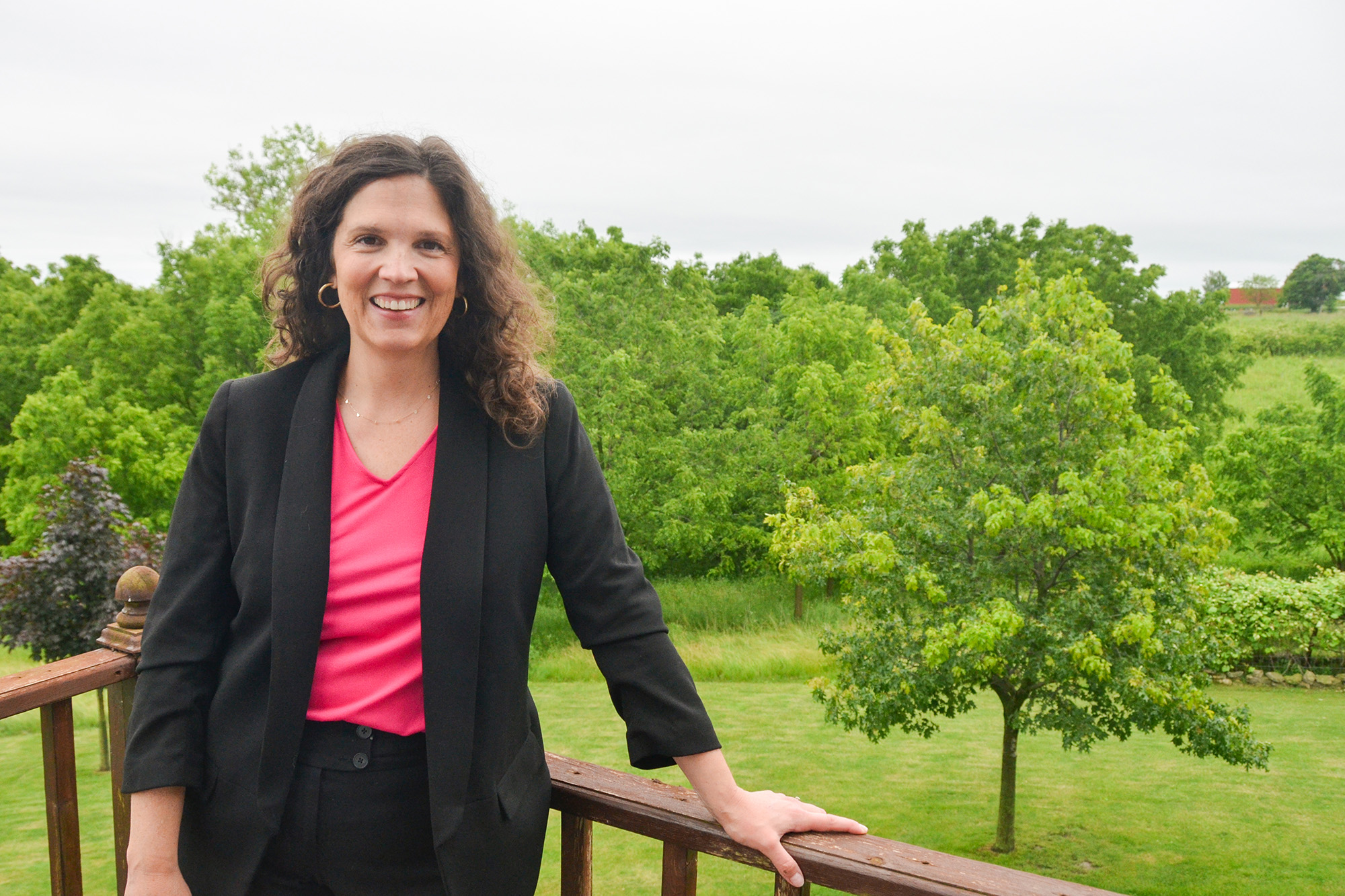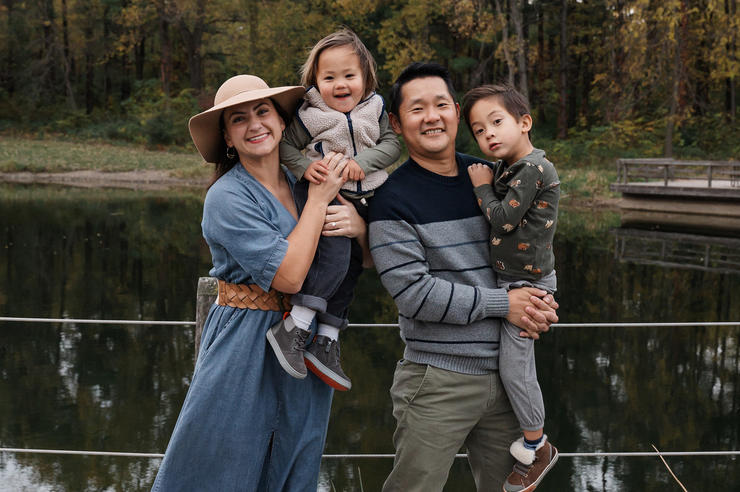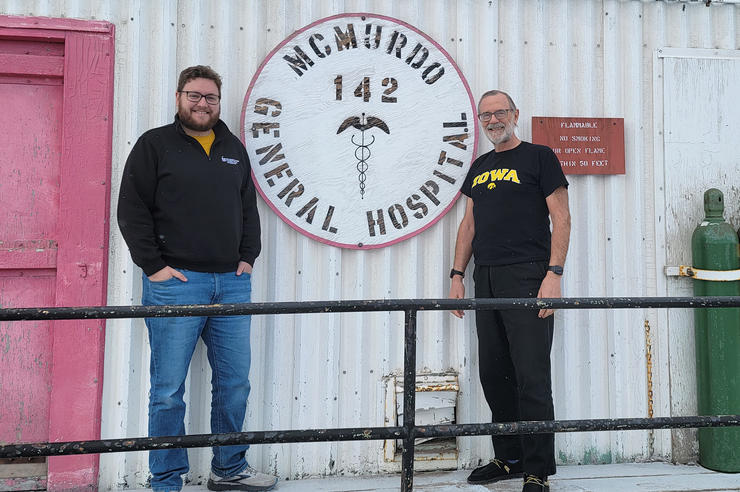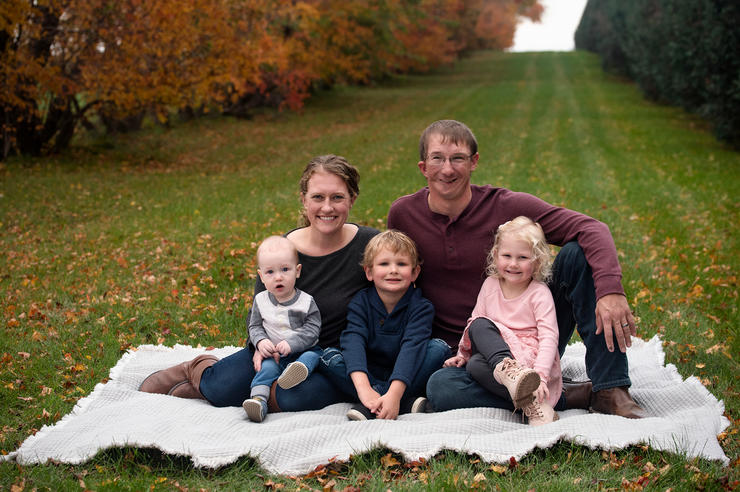Paying it forward as a physician assistant

When Jenny Stegen was searching for physician assistant programs, she didn’t want to go too far from her family in northeast Iowa. She found that one of the closest was also one of the nation’s best.
The University of Iowa, just 130 miles south of Stegen’s hometown of Waukon, boasts the No. 2 program in the country according to U.S. News & World Report. But that isn’t what ultimately drew her to the UI Carver College of Medicine to pursue a Master in Physician Assistant Studies (MPA).
“The No. 1 thing that stood out to me about Iowa, beyond its people and its reputation, was that it trains its PA students along with medical students,” says Stegen, who earned an MPA from Iowa in 2002 with the 23 peers in her cohort. “A PA’s role is defined by our work with physicians — we extend the care of physicians and provide access to care in rural and underserved areas — so working together in our education made sense to me. At first, I was nervous because I didn’t know how we’d be received by the med students, but there was a warm welcome. They knew we were a competitive group of people, and I felt respected. We sometimes broke into small groups, and it felt like a collaboration.”
Students studying to become physician assistants at the University of Iowa are trained in a rigorous 28-month program alongside medical students in the UI Carver College of Medicine.
Tied for No. 2 in the nation in U.S. News & World Report rankings, Iowa’s Master of Physician Assistant (MPA) curriculum uses an innovative approach that focuses on the integration of basic sciences with clinical application, exposes students to earlier clinical activities, and prepares them for team-based practice. An area of emphasis is to provide care to those in underserved or rural locations.
In Iowa’s highly selective PA program, which began in 1972 and lasts 28 months, students are heavily integrated with medical students for the first three semesters and are graded on the same scale. The curriculum focuses on three areas: mechanisms of health and disease, medicine and society, and clinical and professional skills. Graduates can become licensed medical professionals, and although they practice under the supervision of a physician, PAs enjoy relative autonomy, examining patients, making diagnoses, and prescribing medications. They work in a variety of medical settings, from outpatient clinics and hospitals to surgical centers and mental health facilities.
Stegen, who became a certified nursing assistant (CNA) at age 15 and studied biology at Luther College, returned to northeast Iowa after graduating from Iowa and has worked as a physician assistant in family medicine ever since. She says the name of the profession is somewhat misleading, noting that many in the health care field have started to adopt the term “advanced care practitioner.” The scope of a PA’s practice, she explains, is extensive.
“PAs perform a wide range of care and see patients of all ages,” Stegen says. “We help people with their preventative care, encouraging children to get their vaccines and adults to complete their cancer screenings. We order and interpret labs and X-rays. PAs manage chronic conditions such as diabetes and heart disease. We also manage acute problems such as fractures and abdominal pain. You will find PAs working in hospital settings as well as in specialty fields such as surgery, dermatology, and gynecology. There is a wealth of job opportunities for PAs due to the diverse roles we can perform.”
“Iowa made a point to place us in a wide variety of medical settings. In our second year, for example, I trained at a number of hospitals and clinics across the state. I went to the VA and learned about the services offered to Veterans. I also spent time with a surgeon who worked at an extremely demanding pace, so I got to see that firsthand. Those experiences open your eyes — not only to the diversity that you encounter in medical practices, but also in people and the world in general. It was an amazing education.”
Though she often feels pressed for time — like other health care professionals, she must balance patient interaction with the required administrative documentation — Stegen says the work is extremely satisfying.
“I love getting to know people, learning more about them and their families and the things they are doing in their lives,” she says. “I am proud of the relationships I have established. I am always going to give my patients 100%, and I think they know that about me. If I can’t solve a problem, I am going to ask someone who can help me find the answer. There is a lot of trust built over 22 years, and I feel really good about that.”
As a girl, Jenny Stegen often tagged along with her mother, a nurse who saw patients at a hospital and in a nursing home. That piqued her interest in health care, so at age 15 she became a certified nursing assistant (CNA). She loved it and studied at the University of Iowa to become a physician assistant. She encourages others to get similar experiences before committing to a career.
“Health care is not for everyone. Like a lot of careers, there are many challenges. You have to want to help improve the health and lives of others above anything else, and the best way to know if it is right for you is to get hands-on experience. Whether you job-shadow, volunteer at a hospital, or become a CNA, see it and do it firsthand so that you know if caring for people will be a satisfying career for you.”
Stegen recently made the difficult decision to leave her longtime job at Gundersen Health System in Waukon for a position at the Veterans Affairs outpatient clinic in nearby Decorah.
“It is really gratifying to be able to care for people in the small town where I was raised, people who supported me as I grew up and who now support my kids. It is my village,” she says. “But I come from a strong military family. My dad was a Vietnam Veteran, and I was raised to be extremely patriotic and respectful of our Veterans. It has always been a part of my life, so when a job opportunity arose at the VA clinic in Decorah, I had to consider it.”
The connections Stegen has made with her patients demonstrate what Iowa is looking for in prospective PA students, says David Asprey, chair of the UI Department of PA Studies and Services.
“Jenny has that unique combination of skills and attributes that makes for a great health care provider,” Asprey says. “She is very bright and has the ability to quickly process and assimilate large amounts of information to then be able to diagnose and treat her patients effectively, while also having a very positive and engaging personality that helps her quickly gain the confidence of her patients. That, coupled with her own life experiences, allows her to relate to patients and anticipate some of the challenges that they will encounter on their health journey.”
“In a small community, you have teachers, coaches, pastors, and store clerks who serve your family and want to get to know you. They want to see you succeed. They are advocates, and some become mentors,” Stegen says. “It is nice to come back to a community where I formed these relationships growing up and feel really connected. And now this village is supporting my own children.”
Although Stegen knew she wanted to return to her hometown community — she was married as an undergraduate, and her husband remained there, working as a teacher while she studied in Iowa City — she says she appreciates the diversity she was exposed to as a UI student.
“Iowa made a point to place us in a wide variety of medical settings,” she says. “In our second year, for example, I trained at a number of hospitals and clinics across the state. I went to the VA and learned about the services offered to Veterans. I also spent time with a surgeon who worked at an extremely demanding pace, so I got to see that firsthand. Those experiences open your eyes — not only to the diversity that you encounter in medical practices, but also in people and the world in general. It was an amazing education.”
Perhaps Stegen’s biggest takeaway from her UI education is the importance of being a lifelong learner.
“Our professors at Iowa always encouraged us to take the opportunity to learn from each other, to learn through reading, to learn through studying, to learn through attending medical conferences,” she says. “You will continuously learn. It is a continuum that really never stops as you are practicing medicine.”


